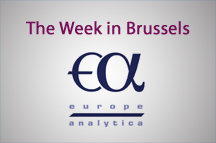 Strasbourg corner
Strasbourg corner
The last plenary session in Strasbourg before the summer recess was eventful with some key decisions made. Former Bulgarian Member of the European Parliament (MEP) Mariya Gabriel from the European People’s Party (EPP), the largest political group in the European Parliament was approved and welcomed as the new Commissioner for the Digital Economy and Society by a large majority on Tuesday, 4 July. As Commissioner responsible for the Digital Single Market, Gabriel takes over some controversial but important issues to many of our clients including reform of Copyright in the DSM, ePrivacy, Audiovisual Media Services and future initiatives on Online Platforms. Vice-President Andrus Ansip has been ‘caretaker Commissioner’ since Commissioner Oettinger moved to budgets, but remains overall in charge of the DSM in his VP role.
Talking of copyright, distancing themselves from former EPP MEP Theresa Comodini’s controversial draft report for Parliament’s Legal Affairs Committee (JURI), the members of the EPP group formally reviewed their position on copyright in Strasbourg and reaffirmed their support for the European Commission’s proposal to bring in a neighbouring right for press publishers as part of their draft directive on copyright in the DSM. They also agreed to continue supporting the proposals to redress the ‘value-gap’ thereby confirming their group position from last year and rejecting Comodini’s proposals. Fellow EPP member Axel Voss has taken over Comodini’s brief as Rapporteur for copyright after she returned to Malta following their elections last month and it lies with him to work out how to reconcile his group’s position with the many amendments tabled by MEPs from across the political spectrum. The Vote in JURI will be in October. More on the DSM follows below.
Meanwhile Estonia took over the six-month EU Council presidency on 1st July, and to mark the occasion Prime Minister Jüri Ratas took the floor in Strasbourg and stressed that the ongoing Brexit process will not overshadow their digital priorities as they will have their hands full with works on the economic impact of cybersecurity breaches, free movement of data and digitalisation of all communication between citizens and administration.
Europe’s media reporters were unsurprisingly delighted with European Commission President, Jean-Claude Juncker’s lively intervention in the plenary session. Perplexed at the low attendance of MEPs during his speech to thank the Maltese Presidency, he called the assembly ‘ridiculous’ and ‘not serious’ and doubted there’d be so few MEPs if Macron or Merkel were speaking. European Parliament President Antonio Tajani and Manfred Weber, EPP leader, did not take the criticism kindly, reminding him that it is not within his duties to scrutinise the European Parliament, but rather it was theirs’ to scrutinise the Commission. Must have been the hot weather…

Digital Single Market corner
With the Digital Single Market (DSM) project only midway through, the European Parliament is under pressure to move things along. On 4th July, the Legal Affairs Committee (JURI) published its amendments to the broadcasting regulation (Sat Cab), while last week the Industry Committee (ITRE) and Culture Committee (CULT) adopted their opinions on the same file. Next week copyright takes centre stage as on 11th July there will be votes in three committees on the proposal for a directive on a copyright in the DSM. Meanwhile, on-going inter-institutional negotiations on the geo-blocking regulation are stuck for the moment with diverging views on the review clause slowing down the process.
Brexit corner
Concerns about Brexit come from many sources, not just euro-clearing, financial services and the car industry! While EU Brexit negotiator Michel Barnier was worrying about sensitive matters on the single market and euro-clearing getting into the wrong hands and leaking, this week saw an important initiative ‘Our Shared European Future’ bring together more than 400 educational, cultural and scientific organisations and representatives across Europe calling for the implications for the education, culture and science sectors to be taken seriously in the Brexit negotiations. Their launch document received large support from the art sector in the UK and around Europe and advocates for the UK to remain active in projects such as Creative Europe and to create special visas for cultural workers.
Postcript
MEPs take off for their summer holidays from the end of next week so we expect things will quieten down until early September. Looking ahead there will be major votes on copyright and ePrivacy in the Autumn so we expect a busy few months in the run up to Christmas. Christmas? Can’t believe I just said that! Bonnes vacances…














